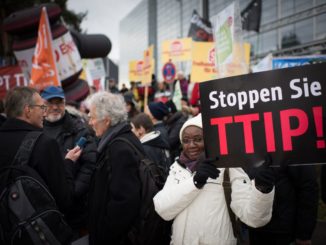 The European Parliament will sit in Strasbourg next week, where they will debate Tuesday and have a plenary (full parliament) vote Wednesday around 12.30 CET.
The European Parliament will sit in Strasbourg next week, where they will debate Tuesday and have a plenary (full parliament) vote Wednesday around 12.30 CET.
Under severe pressure from citizens, a compromise amendment has been proposed by President Schulz of the divided Socialist and Democrats group (S&D) on ISDS in TTIP. This was adopted by 56 votes to 34.
This will almost certainly mean other amendments will be dropped, though there are Parliamentary procedures to get to this point.
Point (xv) of the report adopted in the INTA Committee shall be replaced by:
to ensure that foreign investors are treated in a non-discriminatory fashion while benefitting from no greater rights than domestic investors, and to replace the ISDS-system with a new system for resolving disputes between investors and states which is subject to democratic principles and scrutiny where potential cases are treated in a transparent manner by publicly appointed, independent professional judges in public hearings and which includes an appellate mechanism, where consistency of judicial decisions is ensured, the jurisdiction of courts of the EU and of the Member States is respected and where private interests cannot undermine public policy objectives;
ARC2020 understands that this new amendment may now have the support of some previously critical German, Scandinavian, Italian and Spanish MEPs from the S&D group.
While this amendment has lots of comforting language in it, in essence this is no significant improvement. This is because whatever replaces ISDS will have the same power and the same corporate bias as ISDS: only the corporate sector will have access to compensation; no other group will. It thus privileges large multi and trans national corporations, the kind that can afford to take cases.
As Ante Wessels makes clear:
“The president’s proposal discriminates: only foreign investors would have access, local investors, states or citizens won’t… Supranational fora fall outside a democratic context. There are no voters at the supranational level. The Parliament would not be able to adjust the rules to correct expansionist interpretations”.
Indeed adding in yet another system for resolving disputes will just add yet more unaccountable power to challenge governments and national/EU Courts.
The problems is, clearly, anything which makes ISDS like activity more likely. This amendment does that.
Owen Tudor of the UK’s TUC elaborates on the political background.
The compromise was opposed by UK Labour MEPs, and has dismayed Green and Left MEPs too. It’s not clear how many socialist MEPs will actually vote against the compromise if it is put to the Parliamentary vote next Wednesday (Labour MEPs are likely to vote against, and trade unions in other countries are likely to be pressing the French, German, Italian and Spanish socialist MEPs too.) Right-wing anti-Europeans like UKIP will probably also oppose it.
But with the backing of the Conservatives in the ECR group, centre-right MEPs from the European People’s Party and Liberal Democrats in the ALDE group, the compromise is likely to be adopted. We’ll be urging Labour, Green and UKIP MEPs to stand firm, and calling on Conservatives and the single Liberal Democrat to represent the people who elected them rather than the big businesses who will be rubbing their hands with greed.
ARC2020 has learned however, that some EPP MEPs who also harbour some reservations about ISDS may vote against this text, albeit not publicly for anti-ISDS reasons.
Tudor also spells out 10 reasons to oppose this ISDS lite. As well as what’s above, its worth noting the following:
There are still many reforms to ISDS that have been proposed which are not included in this proposal eg that costs should be borne by the unsuccessful litigant, that litigants should demonstrate they are upholding the law before suing governments (so there will be many cases brought by disreputable companies), that amicus curiae/third party briefs will be permitted etc.
The move throws away the Parliament’s negotiating position with the European Commission far too early.
The compromise amendment means that the Parliament only has the option to vote for ISDS-lite (as set out in the current draft of the Parliament’s resolution) or ISDS-liter as in the compromise, rather than the original amendment put down by MEPs like Labour’s Jude Kirton-Darling which called for excluding ISDS from TTIP altogether.
While this plenary vote is indicative (called Own Initiative Reports) of how the Parliament is thinking and thus has importance, it is not a veto vote on TTIP or ISDS, and thus has no legislative basis.
The European Parliament will however have a veto vote should the talks conclude.
Action: Contact your MEP (currently INTA members, will be updated next week)
Follow the #TTIPTuesday hashtag and tweet your MEP this Tuesday.
Owen Tudor on ISDS Lite (31/05/2015)
All Arc2020 news features on TTIP
ARC2020 briefing notes on TTIP






1 Trackback / Pingback
Comments are closed.